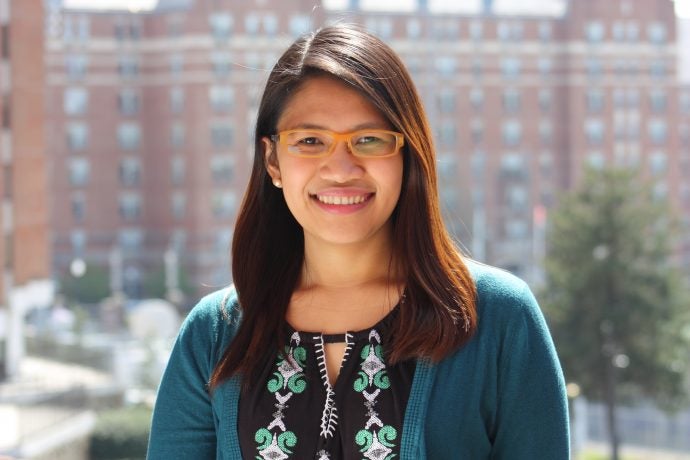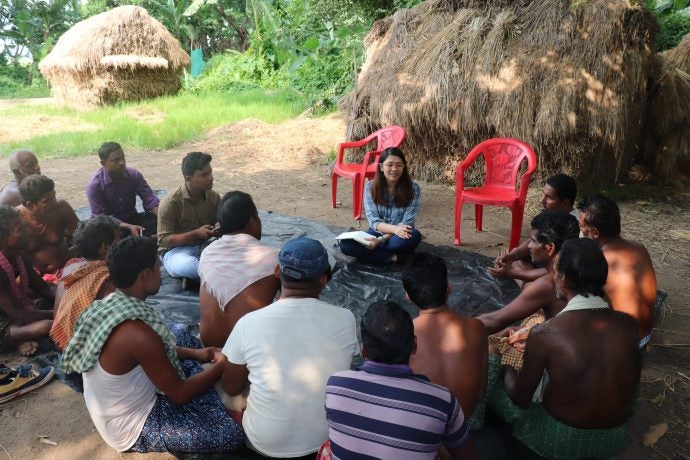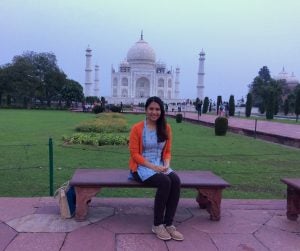
Amina Mendez Acosta (GHD’19) grew up in a farming community in Nueva Ecija province in the Philippines. Acosta’s life has followed a remarkable path that led her eventually to Georgetown. In a powerful section of an essay entitled “The Business of Overcoming Poverty,” which she submitted for the Peter Drucker Challenge Prize, she describes standing in Times Square, “marveling at the fact that a daughter of a tricycle driver and a field scavenger from a so-called third world country, a nobody for all intents and purposes, is actually standing in the middle of one of the richest city in one of the richest country in the world.” The initial seed that eventually sent Acosta halfway around the world, a small loan from a local microfinance called ASKI that allowed her mother to open her own piggery, has become central to her career and studies in the United States.
The loan allowed Acosta to gain placement at a state science high school and then at University of the Philippines. From there she was able to win a scholarship to finish her undergraduate studies at Ohio Wesleyan University in the United States. In her essay, Acosta admits that following graduation from Ohio Wesleyan (with a summa cum laude degree) she was tempted to find a well paying job and move on from her past. However, instead, with her own experiences in mind, she returned to the Philippines and worked for ASKI, which had granted her mother that first sum of money that altered her and her family’s lives so drastically. During the five years she worked implementing programs of financial inclusion, Acosta gained a new understanding of development – or as she so eloquently calls it, the business of “manufacturing prosperity out of poverty.” She understands development as a business, in which “the customers” are the poor. As a result, the poor, according to Acosta, should be placed at the helm of the whole process and treated as partners.

After five years at ASKI, Acosta was ready to develop her understanding more with a master’s Degree. The School of Foreign Service at Georgetown seemed like a perfect fit. The SFS’s reputation, preeminence in international affairs, and location in Washington were big pulls, Acosta states. However, she also praises the Global Human Development (GHD) program specifically: “GHD attracted me ultimately because of the program’s focus on experience-based and a very practical learning curriculum that goes beyond the theory and the classroom. The program’s core requirements included a fully-funded summer internship in a developing country, a strategy consulting engagement for a capstone, and a D.C.-based internship.” During the summer, Acosta carried out research in rural India on the effect of cellphone use and access, in order to increase technology adoption by smallholder rice farmers. Now, she is working with an international network of cocoa producers as part of her capstone project.

During her undergraduate degree, Acosta majored in mathematics with a minor in computer science. She has been able to leverage these two interest to convert her experiences growing up in the Philippines into a quantitative understanding of poverty and how to alleviate it. She explains that she is “passionate about using data and sound statistical skills in making decisions and driving strategies.” The classes at Georgetown that she has found most memorable reflect this flare for the mathematical. She fondly remembers “Quantitative Methods” taught by Professor Charles Udomsaph and “Impact Evaluation” taught by Professor Kelly Jones. Acosta has been impressed by how “supportive, open, and willing” professors in GHD have been. She states that every time she goes to office hours, she leaves filled with optimism, “much needed in grad school!”
As graduation from her GHD program approaches, Acosta plans to join an organization at the intersection of research, strategy, and operations where she can apply the skills she has attained at the SFS. She knows that whatever she ends up doing, it will be informed by her past experiences. She tells students looking to follow similar career paths to first reassess, understand one’s competitive advantage, interests, and life narrative. Finally, she suggests that it’s most important to “ask questions, talk to people. Find that place that excites you.”